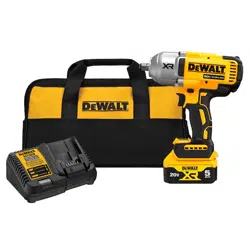Loading ...
Loading ...
Loading ...

ENGLISH
8
Anvil (Fig.E)
WARNING: Use only impact accessories. Non‑impact
accessories may break and cause a hazardous
condition. Inspect accessories prior to use to ensure
that it con tains nocracks.
CAUTION: Inspect anvils and hog rings prior to
use. Missing or damaged items should be replaced
beforeuse.
Place the switch in the locked off (center) position or remove
battery pack before changingaccessories.
To install an accessory on the hog ring anvil, firmly push
accessory onto the anvil
3
. The hog ring
12
compresses
to allow the accessory to slide on. After accessory is
installed, the hog ring applies pressure to help provide
accessoryretention.
To remove an accessory, grasp the accessory and firmly
pull itoff.
Installing and Removing the Battery Pack
(Fig.K)
WARNING: Ensure the tool/appliance is in the off
position before inserting the batterypack.
NOTE: For best results, make sure your battery pack is
fullycharged.
1. To install the battery pack
6
into the tool handle, align
the battery pack with the rails inside the tool’s handle
and slide it into the handle until the battery pack is firmly
seated in the tool and ensure that it does notdisengage.
2. To remove the battery pack from the tool, press the
release button
5
and firmly pull the battery pack out of
the tool handle. Insert it into the charger as described in
the charger section of thismanual.
OPERATION
WARNING: To reduce the risk of serious personal
injury, turn unit off and remove the battery pack
before making any adjustments or removing/
installing attachments or accessories. An
accidental start‑up can causeinjury.
Mode Selector (Fig.A, D)
Your tool is equipped with a mode selector
9
which allows
you to select one of three speeds or Precision Wrench™
mode. Select the mode based on the maximum speed/
torque needed and control the speed of the tool using the
variable speed trigger switch
1
.
Precision Wrench™ (Fig.D)
In addition to normal impacting modes, this tool features
the Precision Wrench™ mode which grants the user greater
control in both fastening and loosening applications. When
set in forward, the tool will fasten at 820RPM until impact
begins. The tool will then pause for 0.75 seconds before
continuing to impact at a rate of 2200IPM, providing
the user with greater control and reducing the chance of
overtightening or damagingmaterial.
When set in reverse, the tool will impact at a normal speed
and rate of 2200IPM. Upon sensing that the fastener has
broken free, the tool will cease to impact and will reduce
speed to help prevent “run-off” of loosehardware.
Specifications
Mode Application RPM
Precision Wrench™ Mode Precision Wrench™ 0–820 forward
0–2300 reverse
Low Mode Normal Impacting 0–650 forward
0–2300 reverse
Medium Mode Medium Impacting 0–1040 forward
0–2300 reverse
High Mode High Speed Impacting 0–2300 forward
0–2300 reverse
ASSEMBLY AND ADJUSTMENTS
WARNING:
To reduce the risk of serious personal
injury, turn unit off and
remove the battery pack
before making any adjustments or removing/
installing attachments or accessories. An accidental
start‑up can causeinjury.
Wall Mounting
Some DeWALT chargers are designed to be wall mountable
or to sit upright on a table or work surface. If wall mounting,
locate the charger within reach of an electrical outlet, and
away from a corner or other obstructions which may impede
air flow. Use the back of the charger as a template for the
location of the mounting screws on the wall. Mount the
charger securely using drywall screws (purchased separately)
at least 1” (25.4mm) long, with a screw head diameter of
0.28–0.35” (7–9mm), screwed into wood to an optimal
depth leaving approximately 7/32” (5.5 mm) of the screw
exposed. Align the slots on the back of the charger with the
exposed screws and fully engage them in theslots.
SAVE THESE INSTRUCTIONS FOR
FUTURE USE
a. Check operation of receptacle by plugging in a lamp
or other appliance;
b. Check to see if receptacle is connected to a light
switch which turns power off when you turn out
thelights;
c. If charging problems persist, take the tool, battery
pack and charger to your local servicecenter.
4. You may charge a partially used pack whenever you
desire with no adverse effect on the batterypack.
Charger Cleaning Instructions
WARNING:Shock hazard. Disconnectthe charger
from the AC outlet before cleaning. Dirt and grease
may be removed from the exterior of the charger using
a cloth or soft non‑metallic brush. Do not use water or
any cleaningsolutions.
Loading ...
Loading ...
Loading ...
